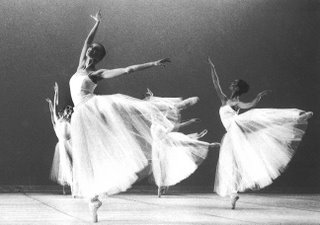Mediocrity, Not Betrayal, Does Giselle In
Please note that earlier today, I misidentified the lead dancers in this review. Irina Golub and Andrian Fadeyev (neither seen nor reviewed) must be considered innocent. Olesya Novikova and Leonid Sarafanov, the other alternative couple, were reviewed (together with Pavleko/Kolb) by Jean Battey Lewis for the Washington Times.
The Kirov-slash-Mariinsky, fond of spreading its cultural riches far and wide – and surely not unaware of the benefits of hard currency – makes Washington, D.C., a regular stop on its tours. We are thankful, especially if Gergiev himself manages to lead the main band in enthralling performances (Verdi Requiem); truth be told, Washington is usually just as grateful even if they give us something from a lower shelf. And the Kirov knows that. Or so it seemed when they sent the Kirov Ballet to D.C., except that they forgot to ship the best soloists in.
We are not a culturally discriminating town and ought not complain that the best is withheld from us in favor of London, St. Petersburg, or Vienna – perhaps even New York – performances. The indiscriminate applause for just about any “scene” of Giselle (even at the fact that there was “fog” on stage for the second act), last Sunday, seemed to underscore that point. If, however, some audience members were curiously unmoved or not entirely convinced that Giselle is in fact one of the best, certainly most dramatic, classical (well, Romantic) ballets there is, well, it may have had something to do with Daria Pavlenko in the title role and Igor Kolb as Count Albrecht, the male lead. The two displayed the kind of dancing that an expert ballet watcher will find full of flaws, fraught with sloppy execution, insufficient extension, insecure landings, and too little air. The more casual observer – and I count myself among them – merely wonders what the whole dancing business is all about; why people get quite so excited about Giselle, or any other ballet, for that matter, in the first place. Giselle has everything that should make it at the very least enjoyable: for a ballet of its time (1842), it has superior music (by Adolphe Adam; inferior still to Delibes or Tchaikovsky, but leagues above the kind professional hacks like Minkus churned out), suffers from a hackneyed story no more than ballets all tend to do (the fewer humans involved – Mandarin, Coppelia – the better it usually is for a ballet’s story-line; but that’s based on a rather flimsy survey of mine) and comes with its tried and true, ever popular Marius Petipa choreography (with a little Jean Coralli here, a little Jules Perrot there) from 1884, in a reconstruction of which the Kirov presented this work.
The two displayed the kind of dancing that an expert ballet watcher will find full of flaws, fraught with sloppy execution, insufficient extension, insecure landings, and too little air. The more casual observer – and I count myself among them – merely wonders what the whole dancing business is all about; why people get quite so excited about Giselle, or any other ballet, for that matter, in the first place. Giselle has everything that should make it at the very least enjoyable: for a ballet of its time (1842), it has superior music (by Adolphe Adam; inferior still to Delibes or Tchaikovsky, but leagues above the kind professional hacks like Minkus churned out), suffers from a hackneyed story no more than ballets all tend to do (the fewer humans involved – Mandarin, Coppelia – the better it usually is for a ballet’s story-line; but that’s based on a rather flimsy survey of mine) and comes with its tried and true, ever popular Marius Petipa choreography (with a little Jean Coralli here, a little Jules Perrot there) from 1884, in a reconstruction of which the Kirov presented this work.
I need not be detailed in my particular feelings about any interpretive art form (like ballet or theater or opera) being offered in a way that carefully excised any and all hints of new ideas over the last 130 years – but in the combination with sub-par dancing it didn’t help the appreciation of this production. The morticians who applied the lovely (cliché-expectation fulfilling) set and costume design are Igor Ivanov and Irina Press. In this form, ballet has only an accidental relation with other art forms we cover at Ionarts, namely being the off-and-on paymaster – and occasionally inspiration – of some composers. Indulging so deliberately in the artificial, its stylized ways can be either entrancing to the newcomer, or more off-putting than the haughty, pompous, screeching world of opera. In fact, it makes your average Donizetti opera look like a study in dramatic realism.
Jean Battey Lewis, Kirov bows after 'Giselle' (Washington Times, June 19) Sarah Kaufman, From the Kirov, A Bright and Buoyant 'Giselle' (Washington Post, June 19) |
On a more positive positive note the Corps de Ballet must be mentioned as having been very good – in the first scene even excellent. I grew up in a time when classical ballet – and by that we instinctively thought of the Kirov or Bolshoi as prime exponents – meant perfection, when symmetry was not something to be approximated but executed with machine-like precision. This is a skill that has all but disappeared, even from Russian troupes (the art only survives in synchronized swimming) – but here it faintly peeked through every so often. In that, these scores of girls were already better than anything I’ve seen of late. With their quality, they kept a tantalizing hope alive that was never fulfilled by the Kirov’s second or third string of soloists. Perhaps that hope would be better invested in the Kirov not shortchanging this little backwater town of ours, Washington, next season?





















































No comments:
Post a Comment